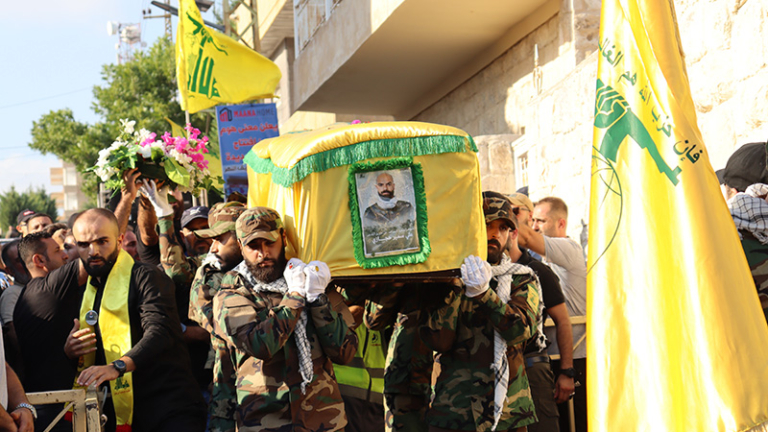
The Israeli war on Hezbollah has just entered another deadly phase characterized by the sophisticated, but criminally minded, use of cyber warfare to detonate communication devices all around Lebanon in the hope of killing or maiming as many party fighters as possible. According to Lebanon’s Health Ministry, the detonation of pagers and walkie-talkies over two days on September 17 and 18 has killed 37 people (including two children) and injured almost 3,000 others. In a speech on September 19, Hezbollah’s Secretary General Hassan Nasrallah declared the attacks an act of terrorism and a declaration of war by Israel, and vowed to continue the party’s operations in the south against Israeli forces.
Israel indeed seems to be on its way to war against Hezbollah and Lebanon after it devastated Gaza and killed more than 41,000 Palestinians there. Israeli leaders have vowed that they will not allow the situation on the border with Lebanon to continue as it has been since October 2023. Some 60,000 Israelis have been displaced from their towns because of Hezbollah attacks. (More than 100,000 Lebanese have also been displaced from their villages following Israeli attacks on their communities.) While meeting with American envoy Amos Hochstein on September 16, Prime Minister Benjamin Netanyahu said that Israel is seeking “a fundamental change in the security situation” in the north. Defense Minister Yoav Gallant told air force personnel on September 18 that Israeli forces are being deployed in the north for a “new phase” of the war. While it is not known whether the pager and walkie-talkie attacks were a prelude to an all-out Israeli assault on Hezbollah, Israeli warplanes struck the party’s positions on September 19 following the death of two Israeli soldiers in Hezbollah rocket attacks.
On the other hand, and despite Nasrallah’s bravado and threats of retaliation for the cyberattacks, it is unlikely that Hezbollah is interested in a war with Israel. From a military point of view, there should be no doubt that the Israeli attacks were a major blow to the party’s image, sense of internal security, and readiness for war. Israel’s success in detonating the devices used by Hezbollah fighters indicates that the party may not be able to defend itself or its cadres as it should because Israeli intelligence has more means and reach to conduct painful operations. At the end of last July, Israel was able to kill Hezbollah’s military commander Fuad Shukr in his apartment in Beirut despite the secrecy surrounding his person and whereabouts. In fact, over the last eleven months, Israel’s military intelligence benefited handsomely from possible Hezbollah security breaches for it to be able to kill hundreds of the party’s commanders, even while they were driving on the highway or riding a motorcycle.
Politically, despite its omnipresence in Lebanese politics, Hezbollah is not totally free to wage war with Israel. Except for those political forces that are fully in agreement with its agenda—and they represent a minority of political forces and the populace—official, popular, and sectarian Lebanon has already declared its opposition to any full-scale war. To be sure, Hezbollah’s political omnipresence is a passive force that helps the party to prevent other political forces from accomplishing their goals, but it does not allow it to force them to accept its writ, especially when it comes to war with Israel. Additionally, it is hard for Hezbollah to wage a full-fledged war as Lebanon’s presidential vacuum closes in on its second year following the expiry of former President Michel Aoun’s term in October 2022.
Finally, Hezbollah will not go to war with Israel without the full acquiescence of and coordination with the Islamic Republic of Iran. But Iran is still in the middle of a presidential turnover after the death of President Ebrahim Raisi and the election of reformist Masoud Pezeshkian whose government has not even been a month in office and is just feeling its way under scrutiny by conservatives. On the other hand, Supreme Leader Ali Khamenei is arguably more interested in preserving the clerical regime in Tehran than in allowing a war with Israel that might draw the Islamic Republic in and thus invite a dreaded intervention by the United States on the side of Israel.
Lamentably, thus, the Israeli leadership, headed as it is by Netanyahu and his cohort of ultranationalist Zionist politicians, is the one deciding whether to finally launch a dreaded war with Hezbollah. Threats and declarations by him, his defense minister, and his generals, indicate that they have made the decision to finally extend the war on Gaza and the occupied West Bank to the Lebanese border. Whether such a war will be a relatively small operation or a large-scale conflagration is yet to be seen. Unfortunately, it has become very hard to believe that the United States can do anything to stop the Israeli war machine from wreaking havoc in Lebanon. Indeed, the Biden administration does not seem to be a factor in what Israel does since it has practically, and perhaps cynically, decided not to use its levers of pressure on its client to prevent unwanted and unwarranted destruction.
The views expressed in this publication are the author’s own and do not necessarily reflect the position of Arab Center Washington DC, its staff, or its Board of Directors.
Featured image credit: Shutterstock/Phil Pasquini

